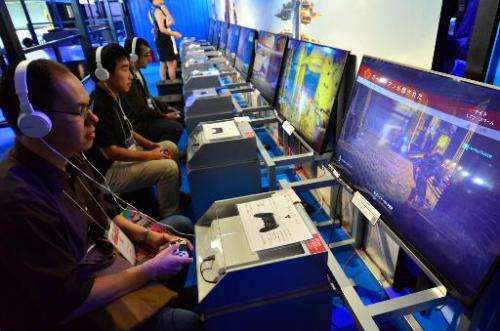Indie game developers sprouting at Tokyo Game Show

Nestled among the industry giants at the Tokyo Game Show Thursday are a growing number of small and independent games developers from Asia and Europe, all hoping they are sitting on the next Minecraft.
Bookended by household names like Sony and Microsoft, many of them are taking a leaf out of Minecraft's block-built book and going for simple graphics and games that are easy to grasp.
Among them is Lin Yule, a 36-year-old Taiwanese developer for Uwan Co, Ltd. which is run by just three people.
Their offering sees a stationary bike connected to a tablet screen, which the player has to peddle frantically to shoot targets on the screen.
"This is probably the first indie game that features excercise, and we developed this because we need physical exercise in a world dominated by applications," Lin said.
Just touting their wares has helped his business partner shed eight kilogrammes (18 pounds) over the last two months, he said.
Tokyo Game Show, Asia's biggest digital exhibition, began its run Thursday, just days after Microsoft announced it was buying Mojang, the Swedish company behind the runaway success of Minecraft, for a cool $2.5 billion.
Often described as digital Lego, players fight to survive in a hostile world populated by monsters while having the power to redesign the environment as they progress.
Despite far less sophisticated graphics than many successful competitors, the game has succeeded in luring both children and more seasoned video gamers, selling more than 50 million copies across platforms including Microsoft Xbox, PlayStation Sony, PCs, tablets and smartphones.
The TGS is a highpoint in the regional tech industry calendar and has drawn more than 400 exhibitors.
Of them, around 70 are independent developers from Asia, North America and Europe and another 70 are small companies from Southeast Asia, including from less developed Cambodia, Laos and Myanmar.
Replicating Minecraft's success
The break-neck spread of tablets, phablets and phones means potential players are everywhere and all are easily accessible to developers.
"I hope we'll see a success similar to Minecraft, because today everyone has a chance in open platforms such as iOS and Android," said Lin.
Putu Sudiarta, the 39-year-old director of Bali-based Bamboomedia, said he was at the show because he wanted to tap the Japanese market.
"We feature educational games, and I came here with some Japanese language games. We hope to localise our titles to become a bigger player," he said.
One of their 50 offerings features simple arithmetic problems that must be solved against a ticking bomb and is designed to appeal to both parents and children.
Unlike the multi-million dollar budgets needed for blockbusters like the Grand Theft Auto series, these kind of games can be done on a shoestring.
"We don't need lots of resources, just one or two developers for one game...I think we'll enjoy further success."
Malaysian studio Kree Ape is pioneering a mix of the online and the real life with its upcoming fantasy trading game, which will use collectable cards featuring sport stars.
"You can put what you like online, but physical cards spread the message in Malaysia," said Alex Cheah, Kree Ape's director.
Tokyo Game Show, at Makuhari Messe, opens to the public on Saturday and Sunday.
© 2014 AFP




















